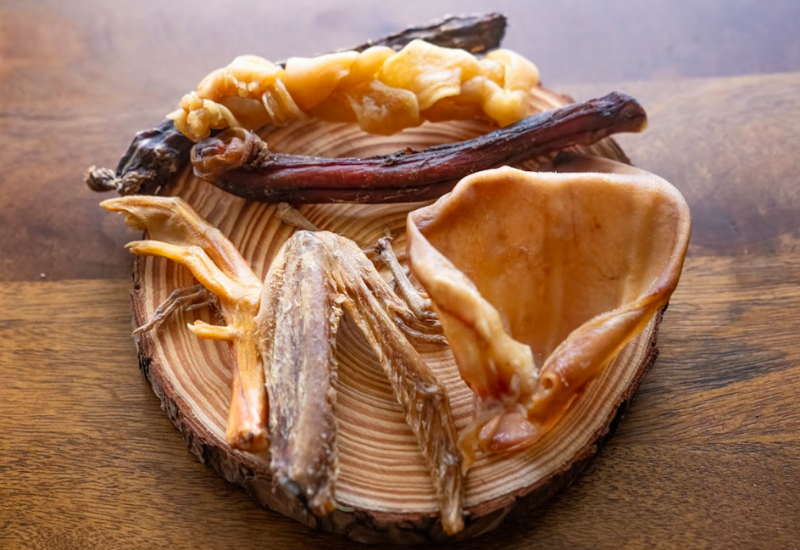The Ultimate Guide to Choosing the Right Chew for Your Dog
Are you struggling to find the perfect chew for your four-legged friend? Look no further! In this comprehensive guide, we'll walk you through all the factors to consider when choosing the right chew for your dog. Whether you have a teething puppy or a powerful chewer, we've got you covered.
We understand that every dog is unique, which is why we've compiled this ultimate guide to help you make the best choice for your furry companion. We'll explore different types of chews, their benefits, and potential risks, ensuring you have all the information you need to make an informed decision.
With our expertise in the pet industry, we'll debunk common myths and provide practical tips to ensure your dog's chewing experience is both safe and enjoyable. From discussing the importance of choosing the right size to understanding different chew materials, we'll leave no stone unturned.
So, whether you're a new dog owner looking for guidance or simply seeking to upgrade your dog's chewing routine, get ready to become a chew expert. Let's dive into the world of dog chews and find the perfect match for your beloved companion.
Importance of choosing the right chew for your dog
Choosing the right chew for your dog is essential for their overall health and well-being. Chewing is a natural instinct for dogs and provides numerous benefits such as dental hygiene, mental stimulation, and anxiety relief. However, not all chews are created equal, and it's crucial to select one that suits your dog's specific needs.
Understanding Your Dog's Chewing Behavior
Before diving into the world of dog chews, it's important to understand your dog's chewing behavior. Some dogs have a gentle chewing style, while others are aggressive and powerful chewers. Knowing your dog's preferences and tendencies will help you choose the right chew that can withstand their chewing habits.
Different Types of Dog Chews
There is a wide variety of dog chews available on the market, each offering different benefits and purposes. Let's explore some of the most common types:
1. Rawhide Chews: Rawhide chews are made from the inner layer of cow or horse hides. They are a popular choice for many dog owners due to their long-lasting nature and dental benefits. However, it's important to ensure that the rawhide is sourced from reputable manufacturers to avoid any potential contamination. Rawhide chews are amongst the most popular, but also the least digestible for dogs
2. Bully Sticks or Pizzles: Pizzles are made from dried buffalo penises and are a favorite among dogs. They are highly digestible and provide a good amount of protein. However, they can be high in calories, so it's important to monitor your dog's intake.
3. Dental Chews: Dental chews are specifically designed to promote oral hygiene by reducing plaque and tartar buildup. They often have a textured surface that helps clean teeth while your dog chews.
4. Animal organs or parts: Dehydrated body parts like chicken wings, quail feet, duck neck, pork ear are also great to chew as they start off hard, but soften up with the dog's saliva. The chews last long and are also nutrient rich. We highly recommend these over the traditional rawhide chews.
Factors to Consider When Choosing a Chew for Your Dog
When choosing a chew for your dog, there are several factors to consider to ensure their safety and enjoyment:
1. Size: Select a chew that is appropriate for your dog's size. Oversized chews can pose a choking hazard, while small chews may be easily swallowed.
2. Durability (Fragmentation): For powerful chewers, opt for chews that are specifically labeled as "indestructible" or "heavy-duty." These chews are designed to withstand aggressive chewing and are less likely to break into small pieces.
3. Ingredients: Always check the ingredient list of the chew to avoid any potential allergens or harmful substances. Avoid chews that contain artificial flavors, preservatives, or chemicals. When possible, always choose single-ingredient chews
Common Ingredients to Avoid in Dog Chews
While most dog chews are safe for consumption, there are a few ingredients that you should avoid to protect your dog's health:
1. Artificial Sweeteners: Artificial sweeteners such as xylitol can be toxic to dogs and should never be present in their chews.
2. Chemicals and Preservatives: Chews that contain chemicals or preservatives like BHA or BHT should be avoided as they can be harmful to your dog's health. Many of the store bought chews contain preservatives to make them last longer. There isn't a lot of research into what effect this has on a dog's gut health, so we recommend to avoid these chews, especially when fully natural single-ingredient chew options abound!
Age-Specific Chews for Puppies, Adult Dogs, and Senior Dogs
Different life stages require different types of chews. Here's a breakdown of age-specific chews:
1. Puppies: For teething puppies, soft and flexible chews are ideal as they are gentle on their developing teeth and gums. Look for chews specifically designed for puppies that offer relief from teething discomfort.
2. Adult Dogs: Adult dogs can enjoy a wide range of chews, including bully sticks, organ chews and dental chews. Choose chews based on your dog's preferences and chewing habits.
3. Senior Dogs: Senior dogs may have sensitive teeth and jaws, so it's important to select chews that are easy to chew and digest. Soft chews or dental chews specifically formulated for senior dogs are a good option.
Chews for Specific Needs - Dental Health, Anxiety Relief, etc.
Beyond regular chewing, some chews are specially formulated to address specific needs:
1. Dental Health: Dental chews that contain ingredients like chlorhexidine or enzymes can help maintain your dog's oral hygiene. These chews are designed to reduce plaque and tartar buildup.
2. Anxiety Relief: Chews infused with calming ingredients like chamomile or lavender can help soothe anxious dogs. These chews are often recommended for dogs with separation anxiety or fear of loud noises.
How to Introduce a New Chew to Your Dog
Introducing a new chew to your dog requires patience and proper guidance. Here are some tips to help you with the process:
1. Supervision: Always supervise your dog while they are chewing to ensure their safety and prevent any potential choking hazards.
2. Start Slow: Introduce the new chew in short sessions to allow your dog to get used to it gradually. Monitor their response and adjust accordingly.
Conclusion
Choosing the right chew for your dog is crucial for their overall well-being. By understanding your dog's chewing behavior, considering the different types of chews available, and taking into account factors like size, durability, and ingredients, you can find the perfect chew that suits your furry friend's needs. Remember to always prioritize their safety and enjoyment during the chewing experience. With the information provided in this ultimate guide, you are well-equipped to make an informed decision and become a chew expert for your beloved companion.
Happy chewing!



